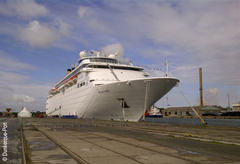- Homepage >
- Press >
- Press releases >
- Details of the press release
News detail
START OF THE 2014 CRUISE SEASON AT DUNKERQUE-PORT
13rd may 2014

Dunkerque-Port’s 2014 cruise season began on Monday 12 May with the call of the Costa Classica on its way to the Baltic.
The Costa Classica, partially chartered by the tour operator TAAJ, docked at Dunkirk at 08.30 this morning. The liner will take its passengers on a tour to discover the ports of Norway and the Baltic until 24 May (Copenhagen, Gdynia, St Petersburg, Tallinn, Stockholm and Amsterdam).
221m long and with a breadth of 31m, the Costa Classica has 654 cabins distributed between 13 decks. Its agent is the firm Humann & Taconet.
The City’s medal was awarded to Philippe Fichet Delavault, the Master of the Costa Classica, during a ceremony attended by Patrice Vergriete, Mayor of Dunkirk and President of Dunkirk Urban Community, Jean-Frédéric Laurent, Deputy Chair of Dunkerque-Port’s Executive Committee, and Armel Leleu, President of the Dunkirk and Flanders Dunes Tourist and Conference Centre.
During the 2014 season there will be two other departures by the Costa Classica, on 24 May and 1 June; one-day calls are also planned with the liner Minerva which will berth at Dunkirk on 5 June, followed by the Braemar (Fred Olsen Cruise Line, on the theme of D-Day) on 7 June. The season will end with the call of the Saga Pearl on 28 July.
Dunkirk, France’s third-ranking port and the seventh port of the North Europe Range, continues to develop its cruise activity. With its privileged geographic situation, the port of Dunkirk allows rapid access to the countries of Northern Europe.
Dunkirk also offers fluid pre-routing by rail and motorway, which COSTA CRUISES sees as an advantage for its clients in France and nearby European countries.
Dunkerque-Port now stands as a new alternative for tour operators and shipping companies specialising in the cruise industry: since 2011, between four and seven liners have called at Dunkirk every year, with nearly 37,000 passengers.
It aims to attract both «transit» calls (one-day calls with the possibility of exploring the city centre and going on excursions) and «turnaround» calls (passenger disembarkation and boarding, and luggage transfers) that require the assistance of port handling companies.
This seasonal activity has high added value and enhances the attractiveness of city centre retail stores as well as the hotel trade and the agencies serving these ships.
The development of the sea cruise industry is an important issue for the region in terms of the economy and tourism. It is also a means of attracting business and a niche development sector for Dunkerque-Port, and has been included in its strategic development plan since 2013.
Since Dunkerque-Port, the Dunkirk and Flanders Dunes Tourist and Conference Centre, Dunkirk Urban Community and the City of Dunkirk signed a partnership agreement in June 2013, creating a Cruise Club (the «DK Cruise Club») to define the conditions for developing the sea cruise sector, the Dunkirk area has launched a number of development initiatives:
• operational study currently under way with Dunkirk Urban Community and the founder members of the Cruise Club on building the cruise sector, and secondary investigations on the inland waterway sector;
• promotions policy: attendance at trade fairs and business conventions, and revamping of materials promoting the port’s offer;
• support for ships’ calls in the area: welcoming cruise passengers, offering services to tour operators, charterers and shipowners (construction of mini-terminal, events, services to cruise passengers, free shuttles to visit the area for certain calls, port handling services, etc);
• promotion of the sector and the host territory as part of the 2014 programme of the Dunkirk-Flanders-Opal Coast Tourism Contract drawn up between the Nord-Pas de Calais Regional Council and Dunkirk Urban Community, and the Dunkirk and Flanders Dunes Tourist and Conference Centre;
• deployment of the DK Cruise Club through the emergence of a local network of partners and focus on the synergy between the ports of the Channel, the North Sea and the Baltic.
Tél : +33 (0)3 28 28 78 78 - Fax :+33 (0)3 28 28 78 77








